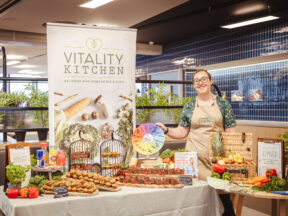Blogs
Sustainable eating

Sustainable eating is a topic that’s been getting a lot of attention lately. With conversations around carbon footprints and emissions, it can be challenging to understand what is healthy for us and what is good for the planet.
But what does it actually mean? Sustainable eating involves making conscious choices that benefit both our bodies and the environment. It’s about involving foods that are produced using eco-friendly practices while reducing those that have a negative impact, such as those that demand excessive resources for production or transportation.
Tips for how to eat more sustainably
1 – Embrace Plant-Based Foods
Animal agriculture is a major contributor to greenhouse gas emissions and requires significant resources. Reducing your meat consumption and incorporating more plant-based foods into your diet can make a world of difference. Start by trying out delicious plant-based alternatives like lentils in your favourite dishes—it’s a small change with a massive impact.
2 – Choose Local and Seasonal Foods
Support local farmers and reduce your carbon footprint by opting for foods that are in season and grown nearby. Not only are they environmentally friendly, but they also offer fresher and more nutritious options. Consider visiting a local pick-your-own farm for a fun family outing while supporting sustainable practices.
3 – Combat Food Waste
Food waste is a global issue, with around one-third of all food produced going to waste. Combat this problem by planning your meals, buying only what you need (meal planning is great for this and never shop on an empty stomach), and getting creative with leftovers. Composting food scraps is also a great way to reduce waste which is also great to use when growing your own veggies at home.
4 – Choose Sustainable Seafood
Overfishing is a major issue that threatens our oceans and the species that inhabit them. Be mindful of your seafood choices by looking for the Marine Stewardship Council (MSC) logo on packaging. This ensures that the fish are caught sustainably and supports the conservation of marine species.
5 – Reduce Packaging Waste
Buying in bulk not only saves money but also reduces the amount of packaging waste. Additionally, bring your own containers and reusable bags to work or when you go to the shops, this will help minimize single-use plastics and their detrimental impact on the environment.
BM’s Commitment to Sustainability
At BM, we’re passionate about sustainability, and we’ve taken significant steps to ensure that our food choices align with our values. We’ve partnered with our nutritional software provider to introduce carbon badges on our menu items, providing transparency on their environmental impact. Our concepts, like Wast-ed & Eat with The Earth in Mind, focus on plant-based proteins, local and seasonal produce, and waste reduction. We even host pop-ups and restaurant takeovers to educate our customers and take them with us on our sustainability journey. We discuss the sustainable practices we have adopted and offer sustainable product samples.
Monthly Challenge
Try to incorporate more plant-based foods into your diet. Whether it’s going meat-free for a day or two each week or creatively swapping out some meat with delicious plant-based proteins in your favourite meals, every effort counts.
Overall, sustainable eating is all about making choices that are good for both our bodies and the environment. By eating more plant-based foods, choosing local and organic foods, and reducing food waste, we can make a positive impact on the planet and our health. Remember, making small changes over time can have a big impact on the environment.
Try this delicious recipe where the meat has been swapped out to create a great plant-based alternative.





